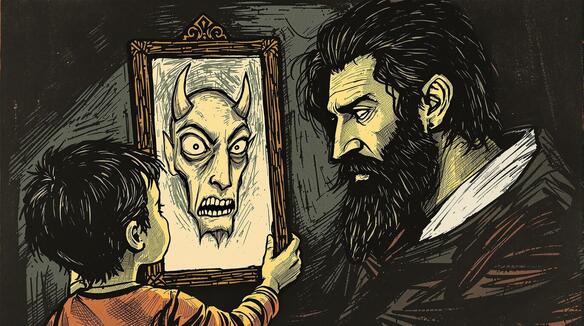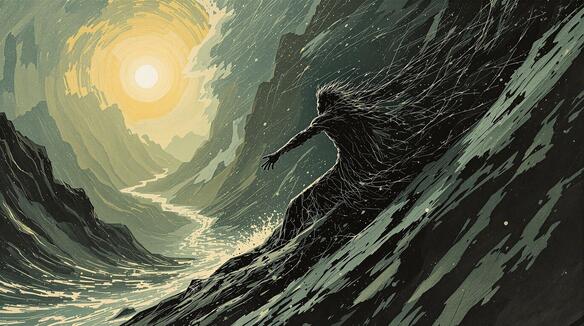In this chapter, Zarathustra retreats to the solitude of his mountain cave, distancing himself from humanity after disseminating his teachings. He waits with the patience of a sower who has scattered his seeds, his soul brimming with impatience and longing for those he loves, as he feels he still has much to offer them. He reflects on the difficulty of restraining one’s generosity out of love and maintaining humility as a giver.
As months and years pass in isolation, Zarathustra’s wisdom grows abundantly, causing him pain due to its overwhelming fullness. One morning, before the dawn, he awakens from a startling dream. In the dream, a child approaches him carrying a mirror and says, “Oh Zarathustra—look at yourself in the mirror!” Gazing into the mirror, Zarathustra cries out in shock, for instead of his own reflection, he sees the grimacing face of a devil mocking him. He comprehends the sign and admonition of the dream: his teaching is in danger; falsehoods are masquerading as his truths. His enemies have become powerful and have distorted the image of his doctrine, causing even his dearest friends to feel ashamed of the gifts he has given them. Realizing that he has lost his friends, he declares that the time has come to seek out those who have strayed.

‘O Zarathustra’ – the child said to me – ‘look at yourself in the mirror!’ But when I looked into the mirror, I cried out, and my heart was shaken: for not myself did I see therein, but a devil’s grimace and scornful laughter.
Eager to return to his friends and even to his enemies, Zarathustra proclaims that he may now speak again, give gifts, and perform acts of love for those dearest to him. His impatient love overflows like streams flowing downward toward the east and west. From the silent mountains and storms of pain, his soul rushes into the valleys. He muses that he has long gazed into the distance and, having spent too much time in solitude, has unlearned silence. He has become entirely a voice, like the roaring of a brook descending from high rocks, eager to hurl his words into the valleys below.

My impatient love overflows in torrents, downward, toward sunrise and sunset. From silent mountains and storms of suffering, my soul rushes into the valleys.
Accepting that his stream of love may plunge into impassable places, he believes that every stream eventually finds its way to the sea. Although there is a solitary, self-sufficient lake within him, his stream of love carries even this along toward the sea. He declares that he is embarking on new paths and that a new language comes to him; he has grown weary, like all creators of old tongues.
He recounts that his “wild wisdom” became pregnant on lonely mountains and gave birth to its youngest offspring on rugged stones. Now it runs wildly through the harsh desert, seeking soft grass—his old wild wisdom searching for the gentle lawns of his friends’ hearts upon which to lay its dearest treasure.
Thus, Zarathustra concludes his reflection in this chapter, poised to descend from his solitude and re-engage with the world, carrying both his love and his turbulent wisdom.
